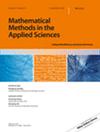Uniform exponential stability approximations of semi‐discretization schemes for two hybrid systems
IF 2.1
3区 数学
Q1 MATHEMATICS, APPLIED
引用次数: 0
Abstract
The uniform exponential stabilities (UESs) of two hybrid control systems comprised of a wave equation and a second‐order ordinary differential equation are investigated in this study. Linear feedback law and local viscosity are considered, as are nonlinear feedback law and internal anti‐damping. The hybrid system is first reduced to a first‐order port‐Hamiltonian system with dynamical boundary conditions, and the resulting system is discretized using the average central‐difference scheme. Second, the UES of the discrete system is obtained without prior knowledge of the exponential stability of the continuous system. The frequency domain characterization of UES for a family of contractive semigroups and the discrete multiplier approach are used to validate the main conclusions. Finally, the Trotter–Kato theorem is used to perform a convergence study on the numerical approximation approach. Most notably, the exponential stability of the continuous system is derived by the convergence of energy and UES, which is a novel approach to studying the exponential stability of some complex systems. Numerical simulation is used to validate the effectiveness of the numerical approximating strategy.两个混合系统半离散化方案的统一指数稳定性近似值
本研究探讨了由波浪方程和二阶常微分方程组成的两个混合控制系统的均匀指数稳定性(UES)。考虑了线性反馈定律和局部粘性,以及非线性反馈定律和内部反阻尼。首先将混合系统简化为具有动态边界条件的一阶端口-哈密尔顿系统,并使用平均中心差分方案对所得到的系统进行离散化。其次,在不预先知道连续系统指数稳定性的情况下,获得离散系统的 UES。利用收缩半群族 UES 的频域特征和离散乘法来验证主要结论。最后,利用 Trotter-Kato 定理对数值逼近方法进行了收敛性研究。最值得注意的是,通过能量和 UES 的收敛性推导出连续系统的指数稳定性,这是研究某些复杂系统指数稳定性的一种新方法。通过数值模拟验证了数值逼近策略的有效性。
本文章由计算机程序翻译,如有差异,请以英文原文为准。
求助全文
约1分钟内获得全文
求助全文
来源期刊
CiteScore
4.90
自引率
6.90%
发文量
798
审稿时长
6 months
期刊介绍:
Mathematical Methods in the Applied Sciences publishes papers dealing with new mathematical methods for the consideration of linear and non-linear, direct and inverse problems for physical relevant processes over time- and space- varying media under certain initial, boundary, transition conditions etc. Papers dealing with biomathematical content, population dynamics and network problems are most welcome.
Mathematical Methods in the Applied Sciences is an interdisciplinary journal: therefore, all manuscripts must be written to be accessible to a broad scientific but mathematically advanced audience. All papers must contain carefully written introduction and conclusion sections, which should include a clear exposition of the underlying scientific problem, a summary of the mathematical results and the tools used in deriving the results. Furthermore, the scientific importance of the manuscript and its conclusions should be made clear. Papers dealing with numerical processes or which contain only the application of well established methods will not be accepted.
Because of the broad scope of the journal, authors should minimize the use of technical jargon from their subfield in order to increase the accessibility of their paper and appeal to a wider readership. If technical terms are necessary, authors should define them clearly so that the main ideas are understandable also to readers not working in the same subfield.

 求助内容:
求助内容: 应助结果提醒方式:
应助结果提醒方式:


